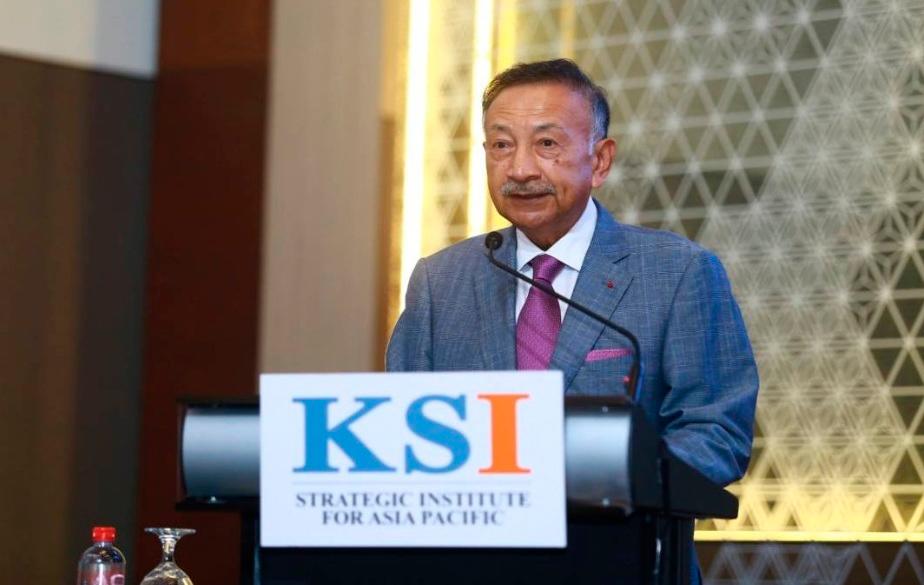KUALA LUMPUR: Malaysia is at a crossroads, balancing its deep economic ties with China while relying on US security guarantees and Western investment flows.
While Chinese companies increasingly shape the country’s digital infrastructure, Malaysia’s financial markets remain closely linked to Western systems.
Tunku Laksamana of Negeri Sembilan Tunku Datuk Seri Utama Naquiyuddin ibni Almarhum Tuanku Ja’afar said this growing split in strategic alliances is making it increasingly challenging for the nation to maintain a steady course.
“We are witnessing the end of what many considered a stable global order. For three decades, markets operated on the assumption that goods would move freely, capital would flow without interference, and geopolitical tensions would be contained.
“That assumption is now dead.
“The post-Cold War consensus, where economics and security were treated as separate spheres, has collapsed. Trade, technology and finance have become instruments of power,” he said in his special address at the Malaysia Economic Forum 2025 today.
Tunku Naquiyuddin said the US is decoupling from China, but only selectively.
In turn, China is building parallel systems of commerce, finance, and diplomacy that bypass Western institutions. The European Union is pursuing a new model of economic nationalism, dressed in green industrial policy.
“Even in Southeast Asia, hedging has its limits. Asean’s traditional strategy of avoiding alignment is under pressure. Supply chains are being redrawn around political lines. Multinationals are shifting production, not purely for cost reasons, but because governments are directing them to do so.
“Malaysia is caught in this cross-current.”
Tunku Naquiyuddin said that for businesses, this means the world is no longer global in the old sense.
“Markets are fragmenting. Standards are diverging. Sanctions, export controls and national security reviews are no longer exceptions. They are policy tools used routinely.
“If Malaysian firms continue to plan based on pre-2016 assumptions, they will find themselves vulnerable. Old models based on cost arbitrage and passive market access are becoming obsolete.
“It is not enough to think in terms of growth. We must now think in terms of exposure, resilience and strategic alignment,“ he told delegates at the forum attended by economists, market analysts and experts, corporate business leaders and various government agencies.
This is not a passing phase, Tunku Naquiyuddin said, adding that the global economy is being permanently restructured by competition between major powers.
“Trade is now a strategy, politics shapes investment decisions and supply chains are being redesigned for control, not just efficiency.”
However, Tunku Naquiyuddin said Malaysia still has an edge. The nation’s connectivity, capital markets, and institutional depth are advantages that cannot be replicated overnight.
“But advantages fade if they are not renewed. The gap between planning and delivery needs to be closed. The distance between government policy and private action must shrink. If we fail to act decisively now, we risk falling into managed decline, where we do just enough to stay afloat, but never enough to move ahead.”
While the government must prioritise disciplined execution, businesses need to embrace risk, invest for the long term, and align with national goals.
Tunku Naquiyuddin said Malaysian companies must urgently analyse their geopolitical risks, looking beyond market diversification to address supply chain, funding, and technology vulnerabilities.
He said building resilience is now as crucial as growth, and ignoring geopolitics in business strategy invites unnecessary danger. Further, Malaysian businesses must move beyond simply following rules and start aligning their strategies with global expectations.
Issues such as environmental, social and governance, data governance, carbon disclosure and technology localisation are now fundamental, not optional.
Treating these as side concerns risks exclusion from higher-value supply chains and global opportunities.
“At the same time, regional integration – especially within Asean – offers significant potential. While progress may seem slow, Asean remains open and dynamic.
“Malaysian firms are well-positioned to lead cross-border partnerships and leverage investment incentives across the region, yet too many still underutilise these opportunities,“ Tunku Naquiyuddin said.
He added that technology must be seen as a core business driver, not just a trendy topic.
Industry 4.0, artificial intelligence, blockchain, cloud computing and digital platforms have been reshaping industries for years. Ignoring these is no longer cautious – it is risky and threatens relevance, he stressed.
Companies, Tunku Naquiyuddin said, must actively assess and adopt the right technologies tailored to their specific needs.
Lastly, the private sector must recognise its central role in Malaysia’s development.
Tunku Naquiyuddin said businesses are not bystanders. They must take initiative, shape policy, and drive progress with the urgency they expect from government.
“The government must focus on disciplined execution. Business leaders must take responsibility for innovation, investment and competitiveness.
“The world ahead will remain volatile. Markets will be shaped by power as much as price. But we are not without agency.
“Malaysia has the experience, the talent and the institutional depth to compete – if we are willing to act with focus and urgency,“ he said.









